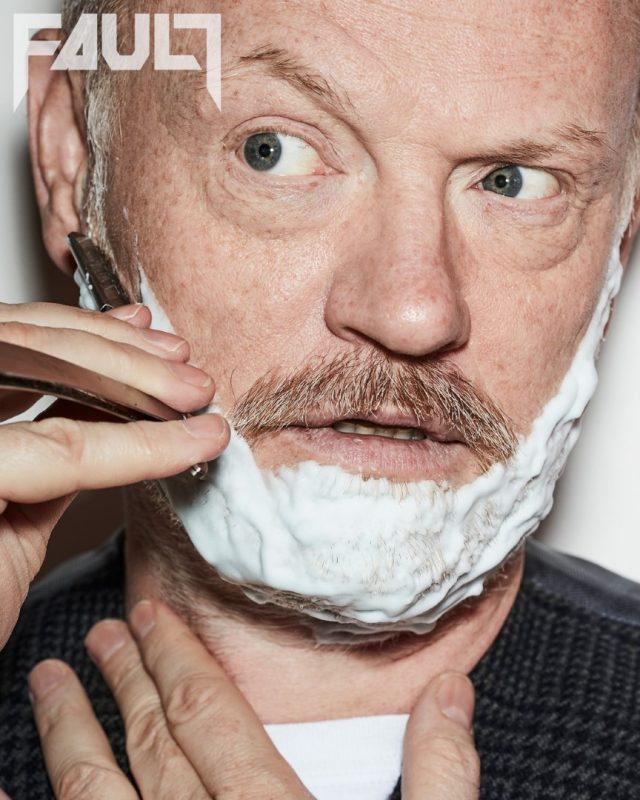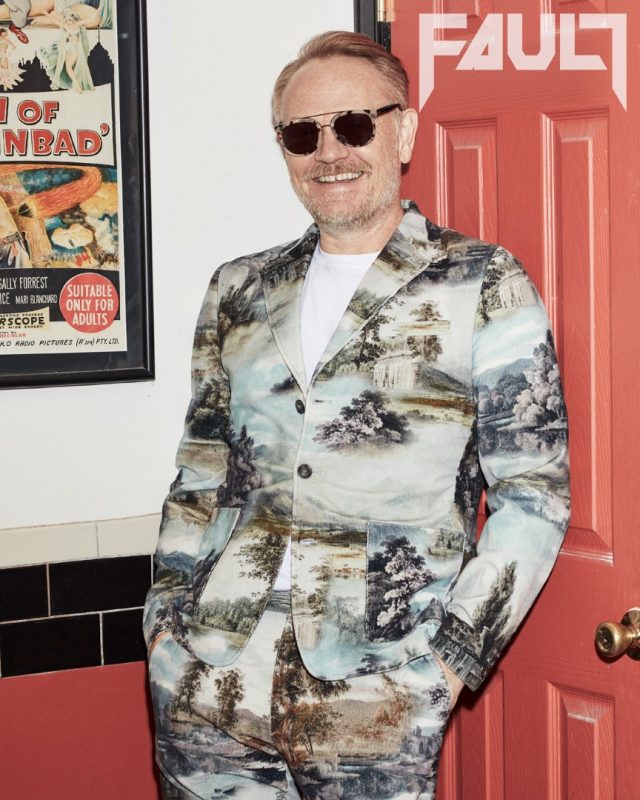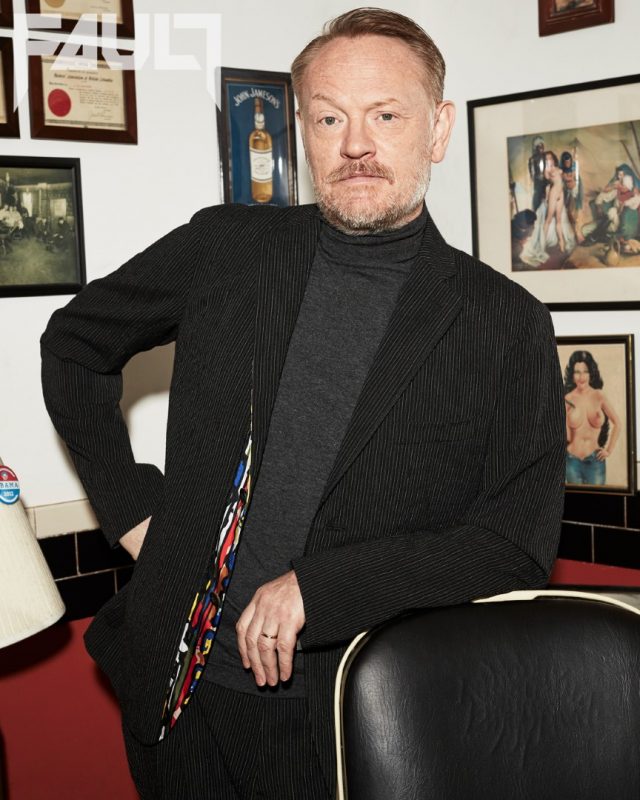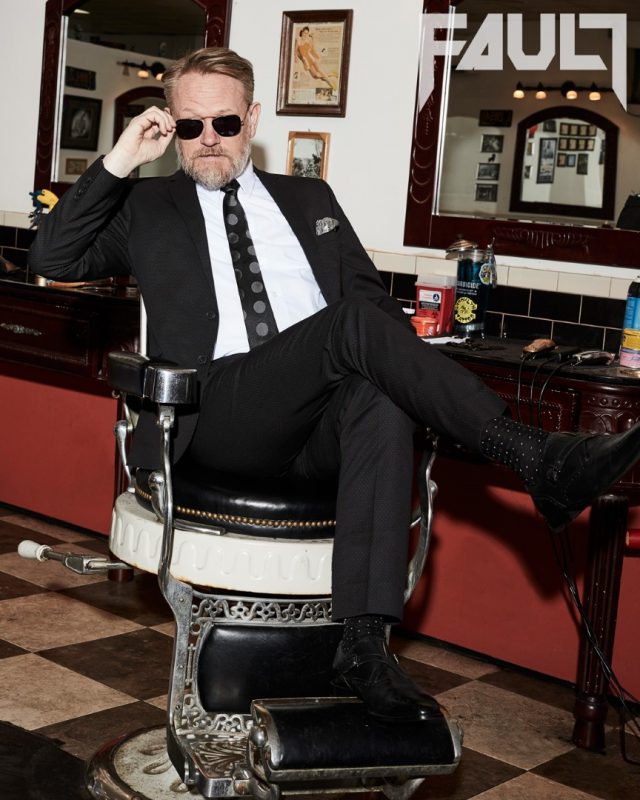Jared Harris: Exclusive FAULT Magazine Issue 27 interview & photoshoot
Jared Harris
“Acting… it’s playing, isn’t it? That’s what’s great about the job. If you don’t enjoy playing then why would someone enjoy watching you do it?”

Stylist + Art Director | Chaunielle Brown
Groomer | Scott McMahan @ Kate Ryan
Set Designer | Lauren Bahr @ Kate Ryan
Photo Assistants | Nicasio Andrade + Xiangyun Chen
Fashion Assistants | Francis Harris + Ariane Velluire
A far cry from the typical, theatrical masks sputtering their pre-fabricated phrases, Jared Harris is a poised and reflective interviewee. As we banter about Brexit, Boris, and all that bullshit, there’s no suggestion that he’s keen to move things along in the direction of some scripted lines about his next role.
It’s a little surprising that he isn’t fervently plugging what promises to be another significant milestone in his storied career: the role of Absalom Breakspear in Amazon’s 2019 series ‘Carnival Row’. After all, the show reportedly has an enormous budget, stars eye-widening leads in Orlando Bloom and Cara Delevigne, and has been put together largely by his former college pal, René Echevarria. But it’s clear that Jared’s been around the block a few times. When he speaks, it’s with the assurance of someone who knows that the next role is never very far away. And it’s reassuring to get the sense that he’s treating our interview with the same sense of enjoyment as he has the rest of his career to date. It’s all part of the job, after all, so you might as well make the most of it…
FAULT: Tell us about your current project [AMC’s ‘The Terror’]
Jared Harris: The job’s great. It’s sort of special, really: the showrunner is a friend of mine from Duke University, so I’ve known him for a really long time. My younger brother’s on it as well, so I get to work with him. That’s always been a personal goal of mine.
The show itself is really well written, and that’s always the first question that one asks: how’s the script?
There’s often a temptation to qualify actors based on a role call of who they’ve worked with – and you’ve worked with some of the biggest names in the business (Tarantino, Soderbergh, Guy Ritchie, David Fincher etc). How important is that to you? To what extent do you take jobs based on the personnel vs the project?
First of all, it’s the script. That said, when I was starting out – and I’ve kept some of those scripts – I remember reading Dracula (by Francis Ford Coppola) and thinking what a load of old tosh it was! It was almost softcore porn – there were a lot of scenes with girls in flimsy blouses getting their boobs out, and I thought to myself, “What on earth is he doing this for? It’s just dreadful!” But then, of course, you go to see the movie and you think, “wow!”
That’s when I got my first education in dealing with really great directors. You just don’t know what they’re going to do with the project. You have to assume that, with films in particular, it’s almost like a lump of clay. Not quite, because scripts are never entirely shapeless, but the great directors fully intend to reshape the material. That was true when I worked on Natural Born Killers. I read the original Tarantino script and it was completely different to the final film as it was directed by Oliver Stone. So, with films in particular, the director is almost more important than the script.
That said, it’s very difficult to improve a bad script. The shape and the structure has to be there to begin with, otherwise no-one really knows what they’re supposed to be doing. You’ve just got so many people trying to tell a story: the costume designers, the cinematographer… the script is the starting point for all of them.
On that note, what level of influence do you – as an actor – have when it comes to interpreting the script?
It really depends. There are so many different factors at play: what type of movie it is; who’s making it – is it studio or independent; who’s directing it; the size of your role… Generally speaking, if it’s a studio film and you’re not the lead, you have very little input at all and no-one’s really interested in hearing your opinion…! They all just want to cozy up to the movie star and stay there.
That said, when I was working on Sherlock Holmes: A Game of Shadows there was total collaboration with Guy Ritchie and Robert Downey Jr. What tends to happen with that sort of film is that the screenwriter is trying to deliver a fresh product – a new take on an old story – and then, during the endless period of noting (where studio executives give notes on the script), it tends to deviate back to something incredibly familiar. Or, to be blunt, something that you’ve seen a thousand times before…
The studios’ obsession is, “when in doubt, re-state the plot.” Tell the audience what’s going to happen, what’s happening as they’re watching it develop, and then tell them what they just saw. And, of course, it’s fucking boring. So they [Ritchie and Downey Jr] tried to figure out a way of taking out as much of the exposition and plot as possible and delivering just enough so that the audience could stay ahead of the story and yet still be surprised be it: because no-one was as far ahead as Sherlock Holmes.
You’ve said that actors nowadays don’t have the same opportunities to rehearse as often as you used to. How do you manage to go between so many different, diverse roles so quickly and without that opportunity to really get into gear?
Well, I’ve never had that opportunity, to tell you the truth. From the beginning, I was always cast late. If you’re the main person on the movie, or the person whom the financing is lining up behind, then you know what you’re going to be doing well in advance. But with me…
George Hall, my principal at Central School of Speech and Drama, said it best, in my opinion. He told us, “You’re not going to have time. You’re going to have to learn how to sketch. You’re going to go into an audition and you’re going to be handed material with 5 minutes to figure something out. You can’t afford to be precious: you can’t do research and character study and work on a back story… you’re not going to have time to do that.” That was some of the most pertinent advice I got from that school.

What’s your FAULT?
Oh God. Forget the magazine; you’ll have a phonebook to fill!
I’m never happy with the work that I’ve done. Someone told me once on ‘Mad Men’ that I’d just done an iconic scene, and asked me if that was the one that my character would be remembered for, and that I’d be remembered for then how would I feel about that? And I remember saying, “Can I do it again? Because I think I can do it better…”
—
Jared’s next project to appear on screens is The Terror for AMC which begins broadcasting right after the finale of Walking Dead. The Terror is an adventure/horror story that fictionalises the real life events surrounding the disappearance of The Franklin Expedition in the Arctic during the Winter of 1847.
—
Find out who else will appear alongside Jared Harris in the issue here
FAULT MAGAZINE ISSUE 27 – THE BEST OF BRITISH ISSUE – IS AVAILABLE TO ORDER NOW
*FAULT MAGAZINE IS AVAILABLE FOR DELIVERY WORLDWIDE*
…Or get your copy digitally via Zinio! 1 year’s subscription = just £14.40

